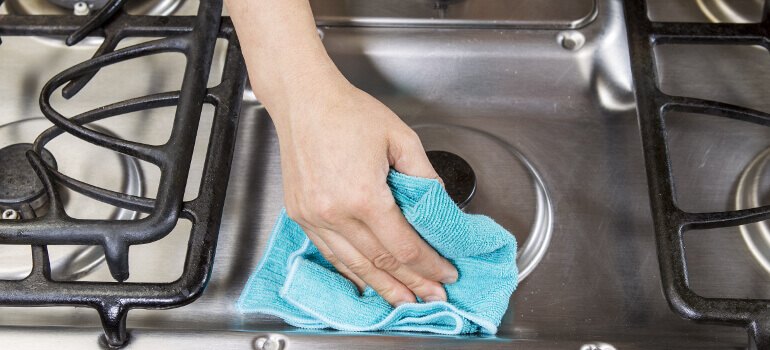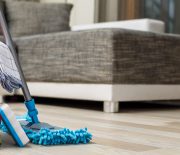Last update: 3 years ago

Stainless steel appliances look best when they’re spotless and sparkling clean. The stove is one of the most used household cooking appliances, and if it’s made from this material, you should learn how to clean it. Still, we often forget to take care of it as much as we would like to.
Although its name, stainless steel stoves can be rather tricky to maintain and may get damaged if not cleaned correctly. To clean your stainless steel cooktop properly without damaging it, you will require the know-how and the right cleaning solution. Well, your concerns end here! We will show you how easy it is to make a DIY cleaning solution at home, using items you may already have.
Cleaning a stainless steel stove with vinegar and bicarb soda
This is one of the best natural cleaners that you can easily make on your own. Even our professional cleaners approve of it. Simple, effective, and it can do miracles when it comes to removing grease stains, burnt on yuck, and rust.
What you will require to clean your stainless steel cooktop:
- White vinegar
- Bicarbonate soda
- Soft dishwashing liquid soap
- Gloves (recommended)
- Spray bottle
- A sponge
- Microfiber cloth (or any type of soft cloth)
Step 1: Begin by removing the grates, if you have a gas cooker, and wipe away any food particles that may have fallen while cooking.
Step 2: Fill a spray bottle with white vinegar and spray the areas you want to clean. Vinegar is an excellent cleaner and grease remover because of its acidic properties.
Step 3: Wait for about 5-10 minutes so that the vinegar does its job.
Step 4: Sprinkle bicarb soda on top of the vinegar. Try to avoid getting it on the burners.
Step 5: Put a few drops of dishwashing soap.
Step 6: Pick up a sponge, dampen it in hot water and begin to scrub. Keep in mind to use the soft side of the sponge as abrasive materials may damage your stovetop.
Step 7: After all the grease and grime has been cleaned, take a wet cloth and wipe the whole stove.
Step 8: Give it a final wipe using a soft, dry cloth.
What should you avoid when cleaning your stainless steel stove?
While stainless steel is an extremely durable material, it can be damaged by the wrong cleaning materials. Here’s what you should never use when cleaning it:
- Bleach – it contains chlorine, which doesn’t go well with stainless steel because of its corrosive properties to metal. Make sure that the cleaning products you use don’t contain chlorine or chloride. If by any chance chlorine gets on your stainless steel cooktop, quickly wipe it thoroughly with water.
- Abrasive cleaners and cleaning pads – Avoid using ammonia, alcohol, and hard water as they may damage the protective layer of the steel surface. Materials, such as steel wool and steel brushes, can scratch the surface. Make sure you always use soft sponges and cloths.
- Wiping in the opposite direction of the grain – Stainless steel appliances have a brushed look made up of tiny lines in the metal – the grain of the finish. When cleaning, wiping, or polishing, always make sure to go parallel to the grain rather than against it. This helps get the surface cleaner and will preserve its original look.
How often should you clean your stovetop?
It depends on how often you use it. If your stove is well-maintained because you wipe it with a damp microfiber cloth after every use, then this will always keep it sparkling clean. However, if not maintained well, it may require a thorough cleaning more often. We recommend cleaning your appliance after a couple of uses.
The more frequently you give your cooking device a good wipe, the less often you will need to spend time and effort on deep cleaning it. And this is undoubtedly a big plus! Especially if you live in a rental property, as the stovetop is one of the main things landlords and agents check during a routine house inspection.
Takeaways
- Be careful what you use to clean your stainless steel stovetop so that you don’t damage it.
- Vinegar in combination with bicarb soda does miracles when it comes to cleaning.
- Avoid using hard scrubbing pads and products containing chlorine (such as bleach).
- Maintain your stovetop clean after each use to save yourself the time and needless hard work in the future.
Do you need a helping hand?
Hire a professional cleaning team!








